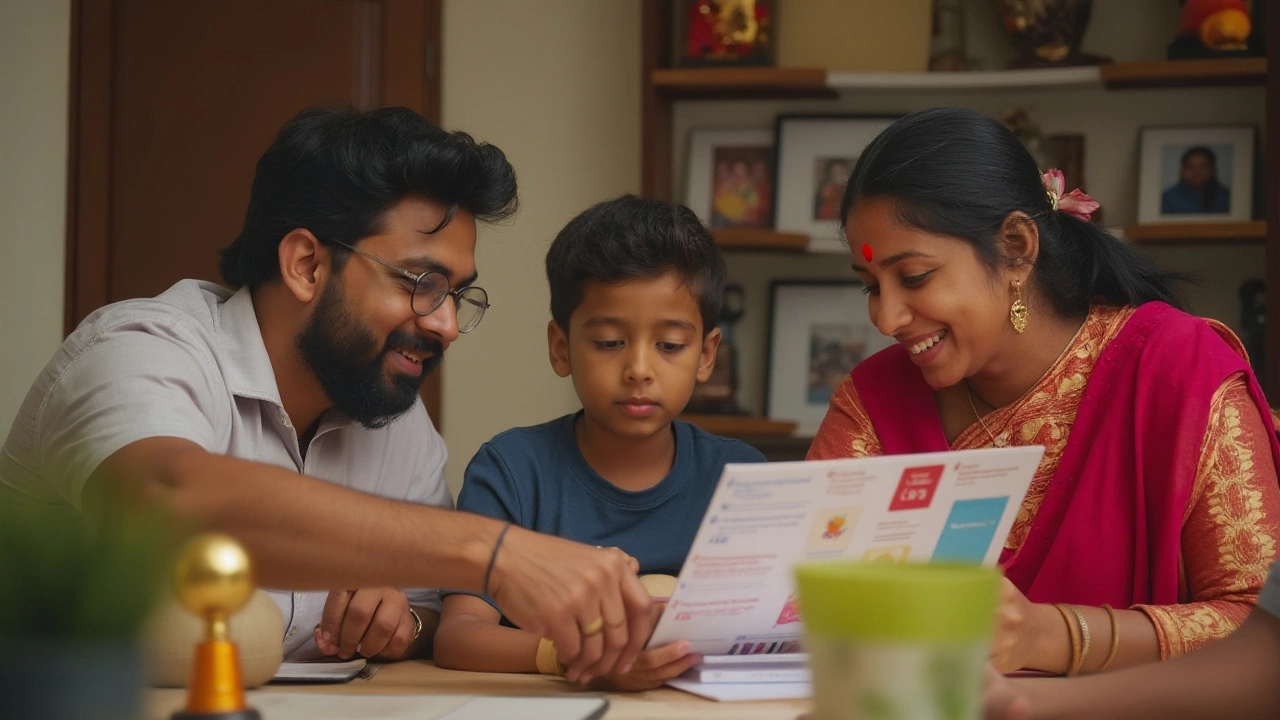India's educational landscape is as diverse as its culture, offering a variety of school boards that cater to different learning needs. Among them, the Central Board of Secondary Education (CBSE) stands out, not just for its nationwide presence, but also for its student-friendly educational approach.
The CBSE syllabus is meticulously designed, ensuring not only a robust academic foundation but also encouraging critical thinking and problem-solving skills. Many parents and students lean towards CBSE as it aligns well with entrance exams for prestigious national institutions.
This article dives into what makes CBSE a preferred choice, weighs its benefits against other educational boards, and provides guidance on how students can make the most out of the CBSE education system.
- Understanding Indian Educational Boards
- Benefits of the CBSE Syllabus
- Comparing CBSE with Other Boards
- Tips for Success in CBSE Exams
Understanding Indian Educational Boards
India's educational system is uniquely diverse, much like its rich cultural tapestry. The country houses several educational boards, each with a distinctive curriculum and examination pattern. These boards have been established with the intent to cater to the different educational philosophies and regional needs while maintaining a standard of education that is accessible and comprehensive. Among the prominent boards, the Central Board of Secondary Education (CBSE board), the Council for the Indian School Certificate Examinations (CISCE), and various State Boards are some of the key players.
The CBSE board is under the purview of the Government of India and is followed by a majority of schools across the nation. Known for its standardized testing and curriculum, it places a strong emphasis on sciences and mathematics, preparing students for national level competitive examinations. On the other hand, CISCE, which governs the Indian School Certificate, is known for a slightly more comprehensive curriculum with an added focus on literature and languages. It is widely appreciated for its approach towards holistic education, nurturing both academic and co-curricular talents.
State Boards in India, governed by respective state authorities, offer syllabi that are more tuned to regional and local needs. These boards are often selected by students who may not seek a centralized syllabus and prefer education in vernacular languages. The variation across states allows for an interesting mix of educational standards, yet these boards still maintain certain common guidelines as prescribed by the National Council of Educational Research and Training (NCERT).
The diversity of Indian educational boards can be viewed as a testament to the country’s commitment to providing tailored educational avenues to different sections of society. – Dr. Shashi Tharoor
Understanding this structure is crucial for parents and students when deciding the educational path that best suits their aspirations. While CBSE is often chosen for its applicability in higher education across India and abroad, the CISCE and State Boards have their unique advantages. The choice typically depends on the balance one seeks between a broad academic exposure and specialized learning in specific areas.
India's focus on education is evidenced not just in how these boards function, but also in their synergy with the ever-evolving global education standards. This blend of regional and universal education principles makes Indian boards unique, inviting students to experience a plethora of learning opportunities aligned with both local and global perspectives.

Benefits of the CBSE Syllabus
When you think of Indian school education, the CBSE board is a term that pops up quite frequently due to its extensive reach and rigorous curriculum. There's a clear reason why it stands tall among various educational boards in India. Often, the emphasis is on preparing students not just for exams, but for life's numerous challenges beyond the classroom. One significant benefit is the focus on a student-friendly syllabus, which is structured to ease the pressure typically associated with academic studies. The subjects are designed to encourage creativity and practical learning rather than rote learning. This approach helps students develop a thorough understanding of the fundamental concepts across various disciplines.
At the heart of the CBSE curriculum is the incorporation of national-level competitive exam syllabi. This is particularly beneficial for students aiming to crack exams like the IIT-JEE or NEET. By aligning their academic curriculum with these exams, CBSE ensures that students don't need to juggle between school studies and competitive exam preparations, thereby streamlining their academic journey. A growing number of educational experts agree that the CBSE board facilitates a smooth transition for students aspiring to work in both national and international markets. For instance, a study conducted by the National Institute of Educational Planning and Administration highlighted how CBSE focuses on concept-based learning and the practical application of knowledge, which is highly valued in today's global economy.
"CBSE's emphasis on continuous and comprehensive evaluation instills a disciplined approach to learning and encourages students to study in a manner that reflects real-world applications," said Dr. Kulbhushan Sharma, an education expert with over 20 years of experience.
Emphasis on Holistic Development
One unique aspect of the CBSE syllabus is its dedication to the overall development of students, integrating extracurricular activities, sports, and arts into the academic sphere. This holistic approach takes education beyond books, allowing students to explore and nurture their interests and talents beyond academics. An innovative component of this board is its streamlined coursework, which reduces unnecessary stress and focuses on students' well-being. By prioritizing balance, the board helps cultivate well-rounded individuals equipped to handle varied challenges.
Moreover, the board's policies on vocational education and skill development encourage students to engage in learning experiences that build practical skills, making them more industry-ready. The incorporation of these aspects ensures that students receive a comprehensive learning experience, preparing them for the ever-changing needs of society. In this manner, CBSE fosters a learning environment that retains students' natural curiosity while equipping them with critical skills for success.
Global Recognition and Future Opportunities
The acceptance and recognition of CBSE's syllabus and certification worldwide further underline its exceptional quality. Students often find it easier to adapt to international curricula, including the International Baccalaureate (IB) and the A-Levels in the UK, when they embark on studies abroad. CBSE's focus on English as the primary medium of instruction also enhances students' communication skills, which is an asset in global interactions. It is this adaptability and forward-thinking vision that illustrate why it is so esteemed by students and parents alike.
In summary, the benefits of the CBSE board extend beyond academics, offering an education that is both practical and comprehensive. By fostering a well-rounded development approach and aligning itself with global educational standards, CBSE remains a popular choice among educational institutions and parents, aiming to provide students with opportunities that transcend traditional academic confines.

Comparing CBSE with Other Boards
When it comes to selecting an educational board in India, the options can sometimes feel overwhelming. The Central Board of Secondary Education (CBSE) is often compared to other boards like the Indian Certificate of Secondary Education (ICSE), State Boards, and the International Baccalaureate (IB). These boards have distinct curriculums, philosophies, and focuses, making the choice dependent on a student’s learning style and future aspirations. The CBSE board, known for its nationwide reach, often garners attention due to its structured and comprehensive syllabus designed with a strong focus on the national competitive exam framework, such as NEET and JEE.
The ICSE board, on the other hand, offers a versatile curriculum with a strong emphasis on English language skills and literature. Its detailed approach can be beneficial for students aiming for foreign universities. State Boards typically offer syllabus flexibility tailored to regional requirements, and they often integrate local language studies into the curriculum. These boards can be advantageous for students who plan to pursue further education within the state. Meanwhile, the International Baccalaureate is recognized globally for its application-based learning, encouraging students to think independently and critically. This board is ideal for students whose families might relocate internationally or who aim for admission to international universities.
Education in India is diverse, and each board provides unique benefits. The choice largely depends on where a student sees themselves in the future. A commonly cited statistic is that the CBSE board has over 21,000 schools linked globally, illustrating its widespread network and accessibility. Comparatively, it is observed that ICSE schools are fewer, but their focus on in-depth understanding and analytical skills is reputed to enhance student problem-solving capabilities.
Parents often wonder which board provides a better education. It is useful to consider specific goals and personal circumstances. For instance, students eyeing engineering or medical fields within India might find the CBSE's alignment with national testing beneficial. Conversely, a student aiming for creative fields or international studies may favor the ICSE or IB systems. To quote an education consultant from a recent study,
"Choosing the right board is about aligning the child's potential and interests with the opportunities provided."It's about striking a balance between what the child enjoys learning and what the board can offer them in terms of subject choices and pedagogical approaches. Ultimately, understanding a student's strengths, weaknesses, and aspirations helps in making the best choice.

Tips for Success in CBSE Exams
Studying for CBSE exams can be daunting, but with proper strategies, students can navigate through the syllabus effectively and perform well. The CBSE pattern is known for its focus on core subjects like Mathematics, Science, and Humanities. To excel, students should create a comprehensive study schedule that allots time for each subject regularly. Consistency is the key. It's essential to break down large syllabus chunks into manageable sections and review them periodically to reinforce understanding. A balance between learning and revision is critical, as it prevents the last-minute scramble.
Practice is another crucial element. CBSE exams often include questions from past papers, making it beneficial to work through previous years’ exam papers. This not only familiarizes students with the exam pattern but highlights the frequently asked questions over the years. Forming a habit of writing sample answers helps improve writing speed and clarity, both of which are assessed during the exams. Engaging in discussions with peers or teachers about complex topics can also provide new insights and solidify one's understanding. The Board encourages an interactive learning approach, which can be leveraged outside the classroom as well.
Quality resources like NCERT textbooks should be the primary study materials as CBSE closely aligns its questions with these standard texts. However, additional reference books by renowned authors can offer diverse problems and explanations for better preparation. Creating personalized notes during classes or self-study sessions can assist in understanding concepts and aid in quick revisions before exams. It's important for students to focus on key terms and definitions, which are often asked in exams, with accurate explanations. Flashcards can be a handy tool for memorization of crucial formulas or terminology.
Despite the rigorous preparation required, maintaining a healthy mindset is equally significant. Stress often leads to burnout, which hinders performance. Incorporating breaks and recreational activities into the study schedule helps refresh the mind. Students should aim for a balanced lifestyle that includes exercising or pursuing hobbies. Such activities rejuvenate mental faculties and prepare students for intense studying sessions. According to a renowned educator, "A clear mind absorbs better, so never underestimate the power of relaxation in a study routine." An encouraging environment, comprising support from family, teachers, and friends, plays a pivotal role in keeping morale high.
During the exam, time management is of utmost importance. Allocate specific time slots to each question based on its weightage and complexity. Start with questions you find easy to boost confidence, then move onto challenging ones. Always keep some time towards the end for revising the answers, checking for any missed parts, or errors. A systematic approach ensures comprehensive coverage of the paper within the stipulated duration. Students shouldn't be afraid to adapt this strategy based on their comfort and writing speed.
For subjects like Mathematics and Science, understanding the application of concepts is necessary. Theoretical knowledge must translate into practical problem-solving skills. To facilitate this, students should focus on strengthening their basics and then gradually move to advanced problems. Teachers often emphasize the importance of neatness and clarity in presentation. This aspect holds weight, particularly in subjective examinations where step-by-step processes must be visible for partial credits. Tables, graphs, and diagrams should be drawn cleanly and labeled accurately, as they enhance the quality of answers substantially.
